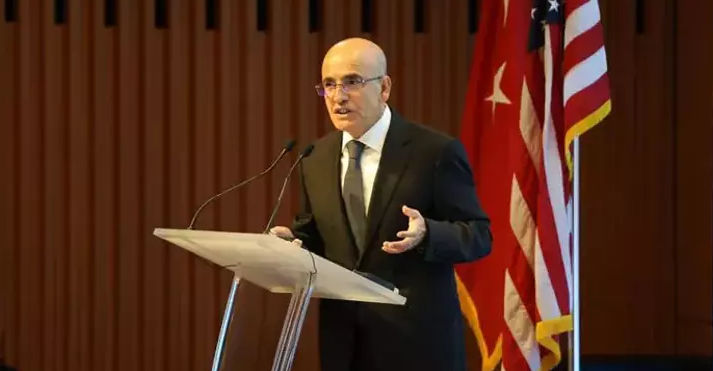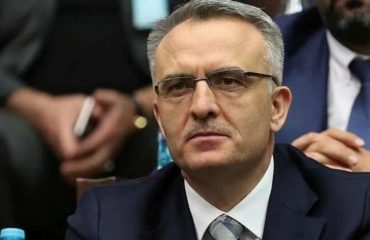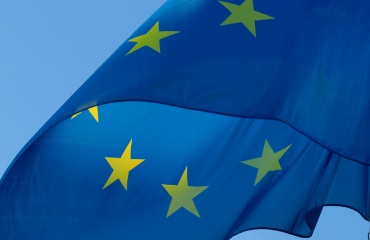

Treasury and Finance Minister Mehmet Şimşek explaining the economic recovery program to foreign investors. The impulse to exit the crisis has played a primary role in the recent conciliatory line of Turkish foreign policy.
Apart from the impulse to get out of the economic crisis, what other force, do you think, could have made President Tayyip Erdoğan visit Egyptian President Abdel Fattah al-Sisi, with whom he had frozen relations calling him a “coup plotter”, and send him messages of friendship and cooperation? And don’t say for the sake of the Emir of Qatar, Sheikh Temim II, that’s practically the same thing.
What other force would have made Yaşar Güler, the Minister of National Defense visit Greek Prime Minister Kyriakos Mitsotakis, whom he said “It’s over for me”, and make him say “I didn’t mean that I would come suddenly one night, I didn’t mean you” in order to mend ties with the United States?
Or what power would have made the President of the United Arab Emirates, Mohammed bin Zaid, the financier of the July 15 coup attempt, a next-door neighbor in order to find foreign resources to get out of the crisis, and make him accept energy concessions reminiscent of Ottoman capitulations? For example, he would have gone to Saudi Crown Prince Mohammed bin Salman, whom he declared the instigator of Jamal Khashoggi’s murder, and embraced him as “my brother”?
Or which force could turn the United Arab Emirates President Mohammed bin Zayed, who was labeled as the financier of the July 15 coup attempt, into a neighbor, accepting energy privileges reminiscent of the Ottoman capitulations in order to find external sources to overcome the crisis? For instance, what would make him embrace Saudi Crown Prince Mohammed bin Salman, whom he had declared as the mastermind behind the Jamal Khashoggi murder, saying ‘My brother’?
Certainly, Finance and Treasury Minister Mehmet Şimşek wouldn’t tell him to do these things; he is a technocrat-politician who draws clear boundaries. So, how does it happen?
Intelligence sees first
In the Soviet Union, Yuri Andropov, the head of the KGB, was the first to realize that the system was stuck. Because that’s somewhat the job of intelligence officers. Andropov wanted to take control of the situation, but after the defeat in Afghanistan, it became even more challenging to revive the economy. It was too late; the Soviet Union collapsed, and the Russian Federation was established.
There are other examples in between, but coming to the present, recently, the head of the CIA, William Burns, penned an unusual article warning both the administration and Congress, ‘If we don’t change policies, we may lose in Ukraine’
It’s no coincidence that Hakan Fidan, the head of the National Intelligence Organization (MİT) at the time, was the one who re-established Türkiye’s relations with Egypt, the UAE, and Israel before the Gaza Crisis erupted. Looking at the big picture from a distance, it’s not hard to guess that the ones who explained to President Erdoğan back in 2022, when the economic crisis hit rock bottom, that it would be difficult to find external sources without maneuvering in foreign policy were Hakan Fidan, who is now the Minister of Foreign Affairs, and İbrahim Kalın, who is now the head of MİT and was the Chief Advisor to the President at that time (and the operative of reconciling with Russia).
Power lies in the economy and the military
The obstacle was the 2023 elections. Erdoğan won not only with his own power but also thanks to the hard-to-believe mistakes of the opposition, and the team was complete.
Erdoğan had no option other than getting out of the economic crisis. He brought back Mehmet Şimşek, whom he had previously dismissed and replaced with his son-in-law Berat Albayrak, to a position where both domestic and foreign investors would not object. He appointed Fidan to the Ministry of Foreign Affairs and Kalın to MİT. Defense Minister Yaşar Güler took on the task of stabilizing the shaky relations with NATO and the U.S. The team was completed with Interior Minister Ali Yerlikaya.
You might wonder what the Interior Minister has to do with the economy. He has a lot. One of the issues that Şimşek emphasized immediately upon his return was the Gray List. There was a danger that Türkiye would become a haven for money-laundering, a passageway for criminal organizations worldwide, with the attitude of “let the money come, wherever and however it comes from”. Yerlikaya’s emphasis on the fight against criminal organizations has its place in the effort to get out of the economic crisis.
Economy as a priority in foreign policy
We see that the economy-centric foreign policy prioritizes compromise over conflict, highlighting commonalities rather than differences. The thaw with Greece facilitated dialogue with the U.S., strengthened relations with NATO (through Sweden’s membership), and made possible the sale of F-16s. If the reconciliation with Egypt continues, it will bring new political and economic opportunities in the Eastern Mediterranean.
Finding a common ground with Iraq against the PKK, ISIS, and Al-Qaeda is of strategic importance, which can make the Development Road project possible. If the economy, strengthened by diplomatic conciliation without being capitulatory, prioritizes the defense industry, it will also contribute to areas such as health and education.
As seen in the case of the energy privileges sought for the UAE, we are exaggerating this too; it is necessary to avoid steps that will be difficult to repair in the future.
However, when I say that Mehmet Şimşek is the driving force behind the new era in foreign policy, I think I’ve explained what I mean.


